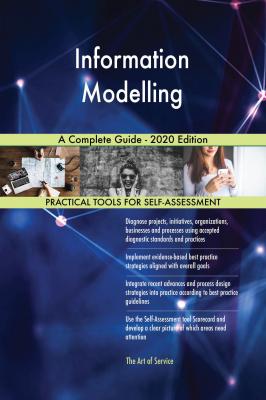Information Modelling A Complete Guide - 2020 Edition. Gerardus Blokdyk
Читать онлайн.| Название | Information Modelling A Complete Guide - 2020 Edition |
|---|---|
| Автор произведения | Gerardus Blokdyk |
| Жанр | Зарубежная деловая литература |
| Серия | |
| Издательство | Зарубежная деловая литература |
| Год выпуска | 0 |
| isbn | 9781867460060 |
66. What are the core elements of the Information Modelling business case?
<--- Score
67. Are approval levels defined for contracts and supplements to contracts?
<--- Score
68. What are the boundaries of the scope? What is in bounds and what is not? What is the start point? What is the stop point?
<--- Score
69. What happens if Information Modelling’s scope changes?
<--- Score
70. Do the problem and goal statements meet the SMART criteria (specific, measurable, attainable, relevant, and time-bound)?
<--- Score
71. What are the Roles and Responsibilities for each team member and its leadership? Where is this documented?
<--- Score
72. What are the dynamics of the communication plan?
<--- Score
73. What is the scope of the Information Modelling work?
<--- Score
74. What key stakeholder process output measure(s) does Information Modelling leverage and how?
<--- Score
75. Are the Information Modelling requirements testable?
<--- Score
76. When are meeting minutes sent out? Who is on the distribution list?
<--- Score
77. What intelligence can you gather?
<--- Score
78. Is there any additional Information Modelling definition of success?
<--- Score
79. Is it clearly defined in and to your organization what you do?
<--- Score
80. How will the Information Modelling team and the group measure complete success of Information Modelling?
<--- Score
81. Where can you gather more information?
<--- Score
82. How do you catch Information Modelling definition inconsistencies?
<--- Score
83. In what way can you redefine the criteria of choice clients have in your category in your favor?
<--- Score
84. What knowledge or experience is required?
<--- Score
85. Is scope creep really all bad news?
<--- Score
86. Do you all define Information Modelling in the same way?
<--- Score
87. Has a Information Modelling requirement not been met?
<--- Score
88. Have all basic functions of Information Modelling been defined?
<--- Score
89. Are different versions of process maps needed to account for the different types of inputs?
<--- Score
90. Are required metrics defined, what are they?
<--- Score
91. What critical content must be communicated – who, what, when, where, and how?
<--- Score
92. How do you manage changes in Information Modelling requirements?
<--- Score
93. How do you manage unclear Information Modelling requirements?
<--- Score
94. Have the customer needs been translated into specific, measurable requirements? How?
<--- Score
95. What is the definition of success?
<--- Score
96. What are the Information Modelling tasks and definitions?
<--- Score
97. What are the compelling stakeholder reasons for embarking on Information Modelling?
<--- Score
98. Is there a critical path to deliver Information Modelling results?
<--- Score
99. Is the Information Modelling scope manageable?
<--- Score
100. Does the scope remain the same?
<--- Score
101. How do you build the right business case?
<--- Score
102. How can the value of Information Modelling be defined?
<--- Score
103. Who approved the Information Modelling scope?
<--- Score
104. How do you manage scope?
<--- Score
105. What is out-of-scope initially?
<--- Score
106. What is out of scope?
<--- Score
107. What are the tasks and definitions?
<--- Score
108. What is in the scope and what is not in scope?
<--- Score
109. How is the team tracking and documenting its work?
<--- Score
110. Who is gathering Information Modelling information?
<--- Score
111. Is the Information Modelling scope complete and appropriately sized?
<--- Score
112. What is a worst-case scenario for losses?
<--- Score
113. Has the Information Modelling work been fairly and/or equitably divided and delegated among team members who are qualified and capable to perform the work? Has everyone contributed?
<--- Score
114. How do you gather the stories?
<--- Score
115. How do you gather requirements?
<--- Score
116. What are the record-keeping requirements of Information Modelling activities?
<--- Score
117. How do you think the partners involved in Information Modelling would have defined success?
<--- Score
118. Is Information Modelling currently on schedule according to the plan?
<--- Score
119. What is the scope of Information Modelling?
<--- Score
120. Do you have a Information Modelling success story or case study ready to tell and share?
<--- Score
121. Is there regularly 100% attendance at the team meetings? If not, have appointed substitutes attended to preserve cross-functionality and full representation?
<--- Score
122.
